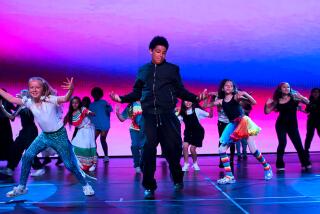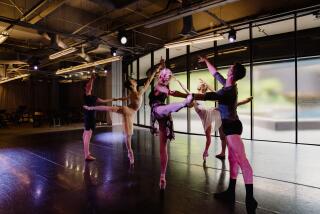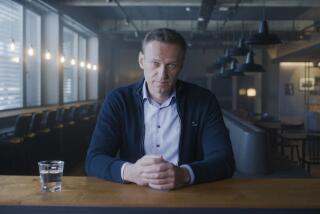TV REVIEW : ‘Nureyev’: The Making of a Dancer
- Share via
Rudolf Nureyev always remained secretive about his private life and relationships, but as much as he was willing to tell can be found in a 1991 documentary by Patricia Foy, screening tonight on the PBS “Great Performances” series.
Previously available on home video, this artful, 90-minute collage of film clips and interviews can be seen at 8 p.m. on KPBS-TV Channel 15 and KVCR-TV Channel 24, and at 9 p.m. on KCET-TV Channel 28.
You won’t hear a word about homosexuality or AIDS, of course, but “Nureyev” shares unusually emotional memories of the man’s turbulent family life in the provincial Soviet city of Urfa and his early experiences in dance. Foy takes her cameras to the exact locations he describes, interviewing a sister and a schoolteacher but also vividly picturing the environment that shaped him.
From folk dance training he gained “temperament and command of stage,” he says, and his 101-year-old former ballet teacher Anna Undeltsova also recalls his “perfect ear for music.” Reminiscences (not all of them pleasant) of his training in St. Petersburg lead to a detailed account of his defection in 1961.
Generous amounts of dance footage supplement the biographical material, though the quality and rarity of it thin out in the section dealing with the Fonteyn/Nureyev partnership--possibly because Foy has mined this vein before in her 1989 “Margot Fonteyn” documentary.
The dancing ranges from magnificent (“Le Corsaire” and “The Sleeping Beauty”) to uneven (“Apollo” and Nureyev’s own “Nutcracker”), with an off-style attempt at Paul Taylor’s “Aureole” qualifying as mediocre. (Nureyev’s association with Martha Graham is never mentioned.) Above any criticism, of course: his epochal collaboration with Miss Piggy in “Swine Lake” (1977).
Incorporating revealing discussions about everything from working with Balanchine to confronting the politics of the Paris Opera Ballet, “Nureyev” uses the dancer’s 1987 return to Russia as a climax, savoring the triumph as well as the irony of the event. The final scenes show Nureyev mulling choices about his future--and speaking about lifelong feelings of estrangement.
Read by Cliff Morgan, the linking narration proves offensively gushy when it’s not downright misleading: It’s one thing to keep Nureyev’s secrets but quite another to call his relationship with the late Erik Bruhn merely “a lasting friendship.”
More to Read
The complete guide to home viewing
Get Screen Gab for everything about the TV shows and streaming movies everyone’s talking about.
You may occasionally receive promotional content from the Los Angeles Times.






